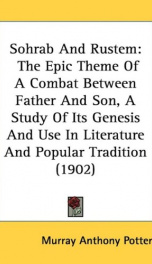four essays

Purchase of this book includes free trial access to www.million-books.com where you can read more than a million books for free. This is an OCR edition with typos. Excerpt from book: PETRARCH THE CRITIC AND READER Other men before Petrarch had loved beautiful speech, and had tried to acquire a beautiful style: Eginhard, for instance, Servatus Lupus, the poets of Provence and those of the dolce stil nuavo, the author of the Novellino. Dante's remarks upon the matter show how deeply interested he was in it, and how carefully he considered it. The story which Petrarch tells of his youth, of his father throwing his Latin books into the fire because he thought that they were stumbling- blocks in the way of the lad's career as a successful lawyer, is significant. The boy was early attracted to Cicero, not merely because of the ancient Roman's philosophy, but also by the " dulcedo " and " sonori- tas " of his style. He is always seeking those qualities, to gratify his craving for them; and he finds them, of course, principally in the works of men who are conscious and ambitious literary artists. " What attracted him in the literature of antiquity," says Pierre de Nolhac, " was its being a work of art. For the first time in centuries (there can be no doubt of this), perfection of form determined an intellectual preference. This seeking of the beautiful for itself alone, and thisusing it as a criterion to establish the relative value of different works which reveal it in varying degrees, constituted one of the most fruitful movements initiated by Petrarch. At the same time, this search and this use restored literary criticism at the very end of the Middle Ages, which had lacked it." Curious it is to see how Petrarch applies this test of eloquence, not merely to purely literary works, but to matters which lie rather outside. One of his reasons for espousing the cause of Plato rather than that of Aristotle was that the latter was not eloquent. In his polemics agai...
Users who have this book
Users who want this book
What readers are saying
What do you think? Write your own comment on this book!
write a commentif you like four essays try:
Other books by this author
Do you want to read a book that interests you? It’s EASY!
Create an account and send a request for reading to other users on the Webpage of the book!



